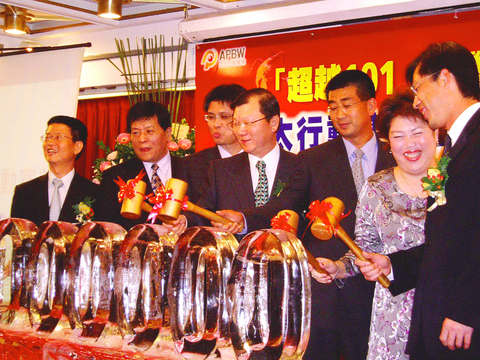Asia Pacific Broadband Wireless Communications Inc (
Asia Pacific Broadband, the only company in Taiwan offering wireless telecom services on next-generation CDMA2000 technology, has been struggling to turn a profit since its inception in 2003, but said the goal was achievable at this point in time.
The CDMA2000 technology enables high-speed transmission similar to the third-generation (3G) technology, which has been adopted by Taiwan's major telecom players including industry leader Chunghwa Telecom Co (中華電信).

PHOTO: WANG YI-HUNG, TAIPEI TIMES
"Growing revenues and reducing capital spending will help us to reach that goal," Asia Pacific Broadband chairman Wang Lin-tai (
Subscribers would expand over 30 percent to at least 1.38 million users next year after passing the one million mark last month, Wang said, adding that the growth would be faster if the nation's private consumption improves.
An increase in sign-ups would also give a boost to its annual revenues, which are set to rise by 50 percent year-on-year to NT$11.3 billion (US$350 million) from an estimate of NT$7.5 billion for this year, Wang added.
The margin for earnings before interest, taxes, depreciation and amortization would also improve to 25 percent next year from the current 16 percent, the mobile carrier said.
Capital spending for next year would be "minor," Wang said, as the telecom had already finished the base station deployment to enable full coverage.
Asia Pacific Broadband received US$210 million in syndicated bank loans in May to expand its network.
The telecom company has 2,300 base stations around the nation.
Asia Pacific Broadband is a member of Asia Pacific Telecom Group (
To boost its customer base, Asia Pacific Broadband spent NT$200 million to set up a retail store chain Asia TeleMart Co (亞太聯通) to sell numbers and handsets.

To many, Tatu City on the outskirts of Nairobi looks like a success. The first city entirely built by a private company to be operational in east Africa, with about 25,000 people living and working there, it accounts for about two-thirds of all foreign investment in Kenya. Its low-tax status has attracted more than 100 businesses including Heineken, coffee brand Dormans, and the biggest call-center and cold-chain transport firms in the region. However, to some local politicians, Tatu City has looked more like a target for extortion. A parade of governors have demanded land worth millions of dollars in exchange

Taiwan Semiconductor Manufacturing Co’s (TSMC, 台積電) revenue jumped 48 percent last month, underscoring how electronics firms scrambled to acquire essential components before global tariffs took effect. The main chipmaker for Apple Inc and Nvidia Corp reported monthly sales of NT$349.6 billion (US$11.6 billion). That compares with the average analysts’ estimate for a 38 percent rise in second-quarter revenue. US President Donald Trump’s trade war is prompting economists to retool GDP forecasts worldwide, casting doubt over the outlook for everything from iPhone demand to computing and datacenter construction. However, TSMC — a barometer for global tech spending given its central role in the

An Indonesian animated movie is smashing regional box office records and could be set for wider success as it prepares to open beyond the Southeast Asian archipelago’s silver screens. Jumbo — a film based on the adventures of main character, Don, a large orphaned Indonesian boy facing bullying at school — last month became the highest-grossing Southeast Asian animated film, raking in more than US$8 million. Released at the end of March to coincide with the Eid holidays after the Islamic fasting month of Ramadan, the movie has hit 8 million ticket sales, the third-highest in Indonesian cinema history, Film

Alchip Technologies Ltd (世芯), an application-specific integrated circuit (ASIC) designer specializing in server chips, expects revenue to decline this year due to sagging demand for 5-nanometer artificial intelligence (AI) chips from a North America-based major customer, a company executive said yesterday. That would be the first contraction in revenue for Alchip as it has been enjoying strong revenue growth over the past few years, benefiting from cloud-service providers’ moves to reduce dependence on Nvidia Corp’s expensive AI chips by building their own AI accelerator by outsourcing chip design. The 5-nanometer chip was supposed to be a new growth engine as the lifecycle